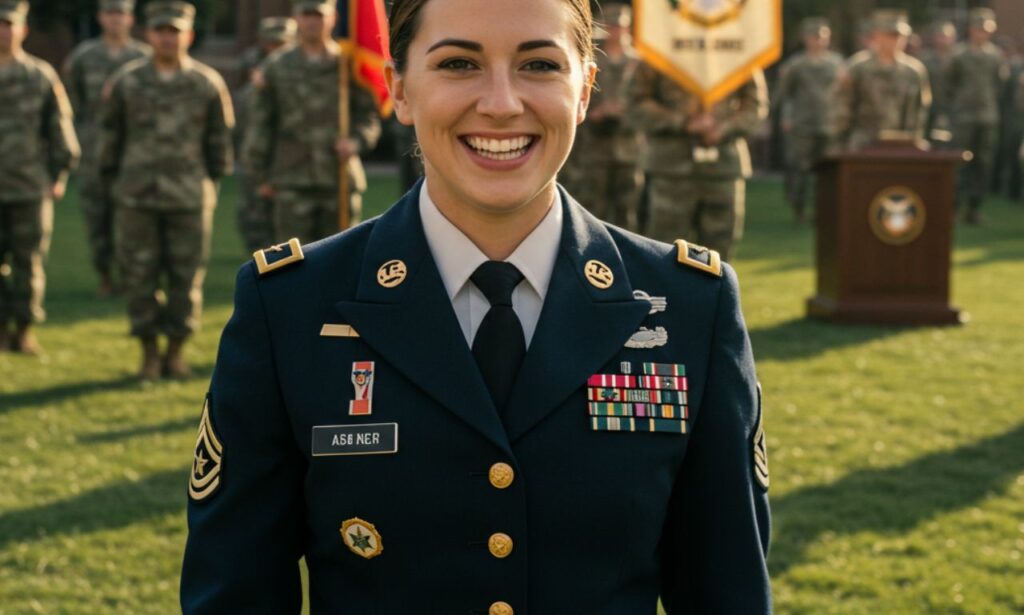The recent SBOLC graduation of Second Lieutenant Paige Ramsey marks not just a military milestone, but a story of perseverance, transformation, and duty fulfilled. Ramsey, who joined the New Mexico National Guard in 2021, recently completed the Army’s Signal Basic Officer Leader Course (SBOLC) at Fort Eisenhower, Georgia, showing that character and courage matter just as much as training and rank. Her story is inspiring for many: from civilian work at Los Alamos to overcoming an injury, to donning the uniform, it’s a journey of commitment and growth.
This article delves into Paige Ramsey’s background, her journey through SBOLC, what this graduation means for her and others, and the larger implications for military leadership, especially for late entrants and women in uniform.
Who Is Paige Ramsey? Roots, Work, Motivation
Paige Ramsey hails from Los Alamos, New Mexico. A 2010 graduate of Los Alamos High School, she later worked at the Los Alamos National Laboratory, a respected institution known for science, safety, and national security. Her civilian career grounded her with discipline, technical acumen, and a sense of service—qualities that would later help her when she entered military service.
Ramsey’s decision to join the National Guard in 2021 was a pivot from her civilian path. Motivated by reasons beyond personal development—service, leadership, giving back—she embraced military training. This shift shows that leadership does not always start young; sometimes it’s chosen later, but with tremendous impact.
Understanding SBOLC: What It Entails & Why It Matters
The Signal Basic Officer Leader Course (SBOLC) is a critical component in the U.S. Army’s training pipeline, especially for Signal Corps officers. The course, held at Fort Eisenhower, Georgia, combines rigorous academic instruction, leadership training, physical fitness, and technical mastery in communications, networks, and secure systems. Graduates emerge equipped to lead in modern environments where communication is mission-critical.
For Paige, SBOLC represented much more than memorizing protocols—it was about stepping into a realm where decisions may have real consequences, where clarity, reliability, and confidence in networked operations can save lives or enable success for whole units.
The Journey Begins: Enlistment & Overcoming Injury
Ramsey’s military path wasn’t without its obstacles. After enlisting in 2021 and completing basic training at Fort Jackson in South Carolina, she encountered an injury that momentarily paused her progress. Setbacks like this can derail many, but Paige treated it as a challenge to overcome rather than a roadblock. She used recovery time wisely—physically, mentally, and emotionally preparing to return stronger.
By becoming a Second Lieutenant in April 2024, she had already made a significant leap: transitioning from being an enlisted member to the officer ranks. That transition, combined with her civilian background, gave her a unique perspective among her peers.
Training at Fort Eisenhower: The SBOLC Experience
During SBOLC, candidates undergo several months of intensive training. At Fort Eisenhower, Paige would have been immersed in a demanding schedule: from classroom instruction in leadership theory and signal operations to hands-on drills, simulations, field exercises, and physical fitness challenges. Projects may involve setting up field communications, securing networks in adverse conditions, troubleshooting under pressure, and leading small units.
These experiences are designed not only to test technical proficiency but to evaluate leadership behavior—how one responds under stress, how one leads others, and how resilience manifests in action. For Paige, with recovery from injury and her civilian work experience, this training was both a proving ground and a showcase of her readiness.
Graduation Day: Symbolism, Honors, and What It Means
On April 30, 2025, at Fort Eisenhower, Paige Ramsey stood among her fellow graduates in uniform, hooded with accolades that reflect more than just academic or technical achievement. Graduation from SBOLC is symbolic: the transition from student to officer, from follower to leader, from learning to commanding. Her peers, instructors, and family bore witness.
Graduation means having authority and responsibility: leading Signal Corps units, ensuring communication networks function flawlessly, and holding the trust that in everyday operations—or during emergencies—others may depend on the systems she supervises.
Strength in Adversity: Resilience Beyond Physical Injury
The injury Paige sustained early on, and her journey through recovery, adds depth to her achievement. Physical recovery is only part of the story; emotional resilience, maintaining discipline, and returning with determination matter equally. Many people give up when faced with setbacks; Paige pushed through. That resilience likely informed her leadership during SBOLC—knowing limitation, empathizing with others, and setting an example.
Such stories resonate widely, especially for recruits, officers, and anyone facing adversity. They show that the path to leadership is not linear.
Civilian Experience: Los Alamos National Lab & Dual Roles
Before her military service, Paige Ramsey worked at Los Alamos National Laboratory. This civilian role offers a contrast: the scientific, structured, technical commitment, often with huge consequences in security, research, or national priorities. Bringing that experience into military leadership in the Signal Corps is a cross-pollination of skills: discipline, precision, technical knowledge, thinking under pressure.
Her dual identity (civilian & military) enriches her leadership: she relates to civilians entering military roles later, understands high tech and scientific rigor, and likely carries a broader perspective in communication and planning tasks.
Women’s Leadership & Breaking Barriers
Paige Ramsey is part of a growing group of women in the U.S. Army and National Guard who are breaking traditional molds. Roles like Signal Officers, which often combine technical, physical, and leadership demands, have historically been male-dominated. Her success reflects evolving attitudes, institutional support, and personal determination.
Her journey provides inspiration: for women thinking about joining the Guard, for those wanting leadership positions later in life, and for those balancing civilian careers and military service. It adds to the conversation about diversity, representation, and capability.
What’s Next: Roles, Responsibilities & Future Potential
Having graduated SBOLC, Paige Ramsey is now officially eligible to lead Signal Corps units or take command responsibilities in communication operations—both within the National Guard and potentially in deployments or joint missions. Her path could include:
-
Overseeing tactical communication networks
-
Disaster response or domestic mission support
-
Technology and cybersecurity collaborations
-
Career advancement through further military education or specialized courses
Her civilian background may also allow her to bridge military and civilian agencies, especially in areas of network security, research, or disaster response.
Public Reaction: Community & Media Response
News outlets, local media, and community members in Los Alamos have celebrated Paige’s achievement. Her graduation was covered in the Los Alamos Daily Post, among others. Family, friends, former colleagues, and community members expressed pride not only in her uniformed role, but in who she is—someone who took a path of service, confronted challenges, and succeeded.
Her story has resonated because it combines recognizable elements: science/expertise (through her work at Los Alamos), small-town roots, overcoming injury, and taking leadership. These are themes many find powerful.
Significance of SBOLC Graduations: Military, Technical & U.S. Guard Implications
Why SBOLC matters: in modern military operations, communications, cyber-networks, signal operations are essential. Officers trained in SBOLC carry responsibility for secure lines of communication, especially in conflict zones or emergency response situations. Each graduate increases the Army’s capacity to function reliably.
For the National Guard, it means stronger readiness. For the broader community, officers like Paige represent the intersection of civilian capability and military discipline. Paige Ramsey SBOLC Graduation Graduations like hers also help recruit new members, especially those who see someone with a civilian background, with scientific experience, or someone who came into service later in life.
Lessons from Paige Ramsey’s SBOLC Graduation
Several lessons emerge from her journey:
-
Resilience matters: physical or mental setbacks are not the end but part of leadership growth.
-
Dual paths can strengthen leadership: civilian and military experiences can complement each other.
-
Representation counts: women, late entrants, people with non-military backgrounds can succeed and lead.
-
Service is more than uniform: it’s commitment, community, readiness Paige Ramsey SBOLC Graduation.
Conclusion: Beyond the Uniform
Paige Ramsey’s SBOLC graduation is more than earning a title—it symbolizes determination, leadership, resilience, and a life committed to service. She reminds us that leadership isn’t reserved for those who start early or follow traditional paths; it’s earned through hard work, adversity, and integrity.
As she steps into her role as Second Lieutenant, her journey lights the way for others. Whether civilian, military, or someone who dreams of service, her story says: it’s never too late to lead, and the uniform carries stories beyond its fabric Paige Ramsey SBOLC Graduation .







